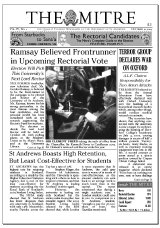
 The Mitre is the quality student newspaper at the University of St Andrews, the third-oldest university in the English-speaking world... more All correspondence should be sent to themitre@gmail.com. Editions of the Mitre generally are available online one month after they appear in print... more |
C O M M E N T A Silver Lining to the Death of the National Party The Downfall of South Africa's Post-Apartheid Nationalists Presents a New Opportunity by
ANDREW K.B. CUSACK
It
was only just recently announced that the National Party of South
Africa – or the ‘New National Party’ as it sought to rebrand itself in
recent years – officially abolished itself. This news was applauded by
some, derided by others, but was a surprise to no one. Having received
just 1.7% of the parliamentary vote, giving it seven seats, it was
certain that the Nats had run out of steam. By this time, the National
Party effectively stood for nothing.Vol. III, No. 5, April 13, 2005 It was not always so. The National Party, which enjoyed decades of electoral success under the country’s previous limited franchise, ruling from 1948 to 1994, used to have principles. Unfortunately for South Africa, they were bad principles. The ascent of F.W. de Klerk to the leadership of the Nats in 1989, signified a change from bad, stagnant, racialist principles to good, sound, conservative ones. It looked as if the Nats, by now doing business under the moniker of the New National Party, would be reformed into a virtuous opposition to the African National Congress government. However, mostly after de Klerk retired from politics in 1997, the party which went from having bad principles to good ones quickly descended into having no principles at all. Guiding thoughts of any kind were quickly thrown out the window. Under the new leader, Marthinus van Scalkwyk, the would-be conservative NNP entered into an alliance with the most decidely anti-conservative Democratic Party to become the Democratic Alliance (DA). Though this alliance strengthened opposition to the ANC (yet another body which has lost most its principles, except for racism), polling the majority of votes in Cape Town at least, the NNP left the Alliance only a year later to coddle up to the ANC itself: the very anti-thesis of sound, reasoned, conservatism. The shuffling back and forth without any apparent rhyme or reason had a clear effect on the NNP’s share of the vote: decline bordering on electoral freefall. Conser-vative whites and other minorities were often pushed towards more extreme parties, having lost their moderate voice in parliament. The recent death of the National Party then presents a wonderful opportunity, as Mr. de Klerk has proposed, to establish a new party which can harness the moderate conservatives in the black community, traditionally wary of the Nats, and the white, mixed-race, Indian, and Chinese voters who previously supported the National Party. As it stands today, if the centre-right parties (the IFP, NNP, ACDP, UCDP, and the Indian-led Minority Front) converged, they would have 46 seats making them the third-largest party in parliament. When such a parliamentary force went to the polls, it would do so from a position of advantage, and could very well overtake the liberal DA to become the official opposition. The task, alas, is daunting, owing primarily to the strong tribal nature of South African politics. Mangosuthu Buthelezi is unlikely to be willing to merge his Inkatha Freedom Party of conservative Zulus, which lets him run KwaZulu-Natal as a personal fiefdom, into any larger, more accountable body. The Indian community have discovered their party, the Minority Front, strengthens their position. And the African Christian Democratic Party tripled its vote in 1999 and may hope to continue its rise alone. Thus it remains to be seen whether any phoenix will rise from the National Party’s ashes. Return to Contents T
H E M I T R E
THE QUALITY STUDENT NEWSPAPER AT THE UNIVERSITY OF ST ANDREWS |
C
O N T E N T S Home About Archives Literary Review On the Mitre: "Its frenetic tone is amusing in a relentless, unpitying way that reminds me of 'Vile Bodies'." Fr.
John Emerson
Regional Superior, FSSP |